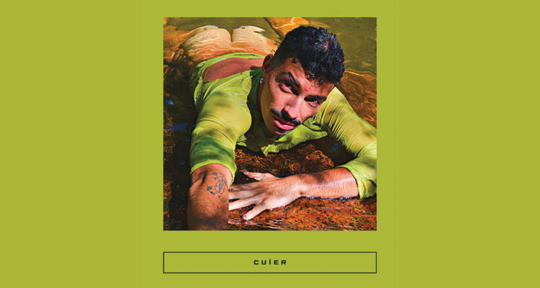Cuíer: Queer Brazil, translated from the Portuguese, Two Lines Press, 2021
Can we translate “queer”?
Cuíer: Queer Brazil—a brand-new anthology of queer/cuíer Brazilian poetry, fiction, and non-fiction translated from Portuguese into English—wants us to grapple with this conundrum. Uniting voices across generations, genders, and mediums, the latest offering from Two Lines Press’ chic Calico series is, like all its predecessors, expansively and thoughtfully curated.
A vibrant portrait by Igor Furtado graces the cover; in it, we glimpse a masc-identified person lying in prone position—one could say amphibiously—on what appears to be the earth of a river bank. His lime-green skin-tight top accentuates the exposure of his body’s lower half, boldly visible in the background through spangles of rippling water. The tattoo on his arm, the earring basking in shadow, the painted nails of his splayed fingers. His direct gaze at the camera mingles enticement and challenge in equal measure.
Like the photograph, Cuíer gives us pause and proclaims its own foreignness—only on its terms are we invited into its gambit. As the only Calico title so far with a non-English word as its name, “Cuíer” demands to be sounded, savoured on the tongue—it audibly carries the phonetic ghost of “queer,” but must be shaped differently in the mouth. The word ostensibly stems from Tatiana Nascimento’s avant-garde “cuíer paradiso,” a poem in Cuíer wherein parentheses, wordplay, and dialect wreath around a yearning for the simple pleasures of quotidian love. What unfolds is an enumeration of possible “less than”s: “less bureaucratic than / marriage equality regulated by the state,” “less surveilled than e-v-e-r-y-b-o-d-y / asking if it is (non-)exclusive,” “less of all that makes us listless.”
In the absence of utopia, one can only imagine it in terms of what it is not (yet). Nascimento’s Afro-futurist linguistic experiments—near the book’s centerpiece—perhaps gesture to the impulse behind Cuíer’s formation: to know another “with no need for armor, / anticipating no answer, / no need to learn how to punch nor / map the space before entering.” A place of silence beyond translation. READ MORE…


